 Petzlover
Petzlover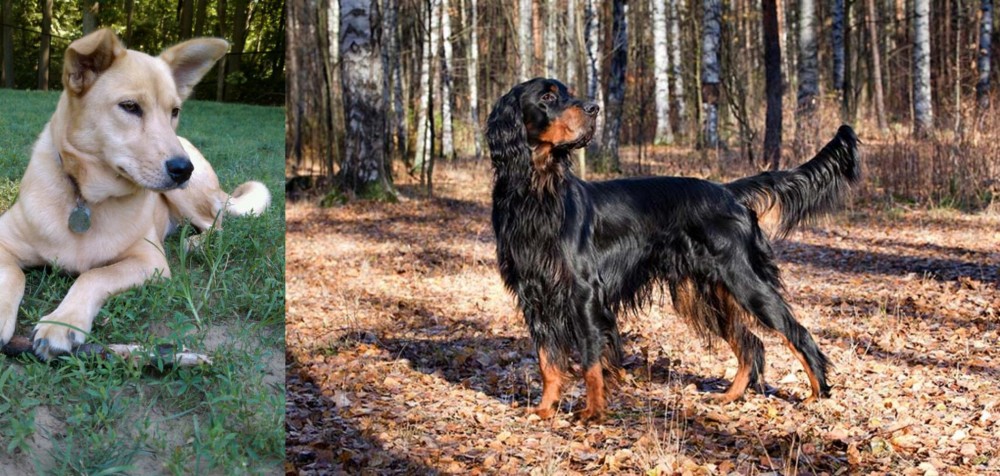 Carolina Dog is originated from United States but Gordon Setter is originated from United Kingdom. Carolina Dog may grow 9 cm / 3 inches shorter than Gordon Setter. Carolina Dog may weigh 16 kg / 35 pounds lesser than Gordon Setter. Carolina Dog may live 3 years more than Gordon Setter. Both Carolina Dog and Gordon Setter has almost same litter size. Both Carolina Dog and Gordon Setter requires Moderate Maintenance.
Carolina Dog is originated from United States but Gordon Setter is originated from United Kingdom. Carolina Dog may grow 9 cm / 3 inches shorter than Gordon Setter. Carolina Dog may weigh 16 kg / 35 pounds lesser than Gordon Setter. Carolina Dog may live 3 years more than Gordon Setter. Both Carolina Dog and Gordon Setter has almost same litter size. Both Carolina Dog and Gordon Setter requires Moderate Maintenance.
 The Carolina dog comes from wild dogs that used to run with the Paleo-Indians of North America, and today they can still be found in their wild state near the Georgia-South Carolina border.
The Carolina dog comes from wild dogs that used to run with the Paleo-Indians of North America, and today they can still be found in their wild state near the Georgia-South Carolina border.
Many scientists believe that the dog was first domesticated from the wolf thousands and thousands of years ago. Today there aren’t many records on the Carolina Dog’s history and it isn’t sure how long they lived their feral lifestyle in the American South, but it seems as though it was for hundreds of years.
You could say that the modern history of the Carolina Dog started in the 1980s. Dr. Pam Brisbin found a puppy at a dump site which looked like the Australian Dingo. Dr Brisbin and other scientists concluded that the Carolina Dog was a remnant of primitive dogs. Since those times the Carolina Dog has adapted well to being a domesticated pet.
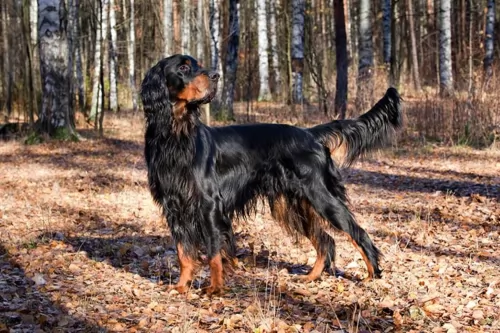 The Gordon Setter includes mixes of the English Setter and the Irish Setter. The original purpose of the breed was to hunt game birds.
The Gordon Setter includes mixes of the English Setter and the Irish Setter. The original purpose of the breed was to hunt game birds.
The dog breed hails from Scotland with a history that dates back to the 17th century. The dog was developed in Gordon Castle by the Duke of Gordon IV.
The dog became popular among hunters in the early 19th century. He is the biggest of the setter breeds. It was in 1884 that the American Kennel Club recognized the Gordon Setter.
 The Carolina dog is part of the Sighthounds Group and looks a bit like a Dingo, German Shepherd and Wolf mix. He has fairly long, pointed erect ears, a sharp wolf-like snout and a long tail that curves when raised.
The Carolina dog is part of the Sighthounds Group and looks a bit like a Dingo, German Shepherd and Wolf mix. He has fairly long, pointed erect ears, a sharp wolf-like snout and a long tail that curves when raised.
The Carolina dog has been re-discovered however and when trained and socialized, they make splendid pets. It’s a medium sized dog standing at 45–61cm and weighing from 15–20kg. He is slender, muscular and athletic with a coat that is short and fairly smooth. Colors for the Carolina dog vary and he can be fawn colored, a gingerish color, black and tan and can have some white areas on the paws, chest, muzzle and tail.
The Carolina Dog has been a wild dog, belonging to a pack and while he isn’t aggressive, he is nervous and aloof around strangers. Good training and socialization provides him with the skills to get along well with his human family as well as with children and other pets in the home.
Because this dog has always been wild, they tend to maintain some of their wild, independent nature and they can be difficult to train and it requires firmness and patience with him, but he is an intelligent breed.
 The Gordon Setter is a large dog, capable of reaching up to 69cm in height and weighing up to 36kg in weight.
The Gordon Setter is a large dog, capable of reaching up to 69cm in height and weighing up to 36kg in weight.
He belongs to the Setter family and is somewhat heavier than the other Setter breeds. Setter dogs are classified as sporting- or gun dogs. He is a beautiful dog with a pitch black coat with tan markings found around the chest, muzzle and paws as well as those two familiar tan dots above each eye.
Sometimes you can find a small amount of white on the chest. The coat is straight and silky but it can be slightly waved with feathering around the legs, chest, ears and tail. Both the tail and the ears of the dog are also long and feathery. The Gordon has an intelligent, dignified look about him.
The Gordon Setter is a confident, fearless, loyal and affectionate dog. They do well with their human families, when there are other pets in the house as well as children.
He can be a boisterous dog so training and socialization will become necessary. Your Gordon Setter is an intelligent dog and also a dog ready and willing to learn. He is calm and even-tempered but playful too.
He isn’t a dog suited to life in the city if there isn’t an adequately sized garden. He is essentially a country life dog well suited to farms or large fenced gardens.
 The Carolina Dog is a medium-sized dog which has managed to survive well in the wild environment. It is this life in the wilds which has made the dog to be shy and aloof around strangers.
The Carolina Dog is a medium-sized dog which has managed to survive well in the wild environment. It is this life in the wilds which has made the dog to be shy and aloof around strangers.
They are skilled and intelligent and when domesticated they make extraordinary pets even though he isn’t an overly affectionate dog. It is why he requires early socialization so that he doesn’t grow up shunning humans.
With training however, the Carolina Dog becomes a well-adjusted, loving and social member of the family.
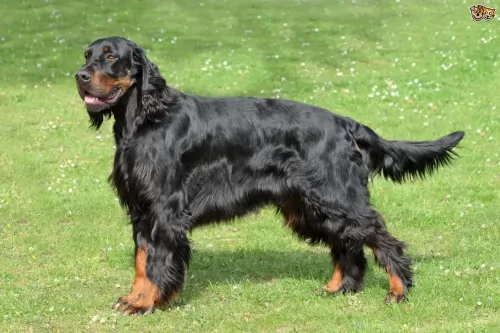 Beautiful to look at, the intelligent and even-tempered Gordon Setter has everything to be confident about. He loves the attention he gets from his human family and is always looking for a pat.
Beautiful to look at, the intelligent and even-tempered Gordon Setter has everything to be confident about. He loves the attention he gets from his human family and is always looking for a pat.
He can be stubborn and he certainly won't like the idea of being left cut off from his family for long periods of time as he is a social dog with those he knows and loves.
The Gordon Setter is energetic and playful so he will need regular exercise. When you bring a Gordon Setter into your home, you bring in a wonderfully loyal pet and companion.
 The Carolina Dog is a fairly healthy breed. You won’t have to be rushing off to the vet often with him if you look after him well in terms of a good diet, a food amount of exercise and plenty of love and attention. In fact breeders of the Carolina Dog have noted that they haven’t seen any cases of genetically inheritable diseases with this robust dog.
The Carolina Dog is a fairly healthy breed. You won’t have to be rushing off to the vet often with him if you look after him well in terms of a good diet, a food amount of exercise and plenty of love and attention. In fact breeders of the Carolina Dog have noted that they haven’t seen any cases of genetically inheritable diseases with this robust dog.
However with all dogs, no matter how healthy they are, there can be problems. Problems common to domestic dogs can include skeletal and visual problems. Many dog owners have their pets tested to identify some of the potential health defects that some dogs are prone to. This can include hip dysplasia, cataracts, cancer and PRA or Progressive Retinal Atrophy.
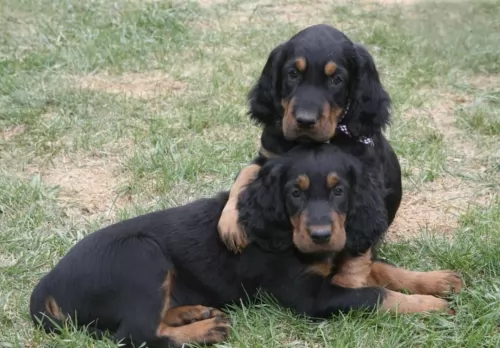 Life expectancy for the Gordon Setter is usually about 10 to 12 years and with good nutrition and care, your Gordon can easily reach 12 years of age.
Life expectancy for the Gordon Setter is usually about 10 to 12 years and with good nutrition and care, your Gordon can easily reach 12 years of age.
Every dog is prone to some common health issues and these include among others hip dysplasia, gastric torsion or bloat, retinal atrophy and ear infections.
Large dogs are more prone to hip dysplasia. The disease is a malfunction of the hip joints causing pain and loss of function in the rear legs.
This eye conditon just gets worse over time and can lead to vision loss.
An under-active thyroid causes a decrease in metabolism. Symptoms of hypothyroidism in dogs include weight gain, obesity, cold intolerance, changes in the skin and coat like hair loss and your dog is lethargic.
This can be very dangerous with your pet as the stomach is swollen and the stomach rotates and twists and can lead to death.
 The Carolina Dog is a seasonal shedder and the shortish coat will simply require a thorough brushing twice a week to keep him in tip top condition.
The Carolina Dog is a seasonal shedder and the shortish coat will simply require a thorough brushing twice a week to keep him in tip top condition.
This dog, with his upright ears, isn’t prone to ear infections as other breeds, but nonetheless as part of his grooming routine, its a good idea to to check his ears inside for wax build-up and dirt. Certainly his teeth should be brushed 2 or 3 times a week with special dog toothbrush and toothpaste. This keeps the gums and teeth healthy and also avoids other diseases that come about because of dental disease.
Whether you feed your Carolina Dog once or twice a day, you want to ensure the very best quality diet to avoid skin problems and illness. You also have to ensure your dog has 24/7 access to fresh, cool drinking water to help him with digesting his food.
There are some excellent commercially manufactured dog foods on the market which have been manufactured for certain stages of your dogs life. Add in some rice, vegetables and meat from time to time and every now and again you can give him some raw meat too.
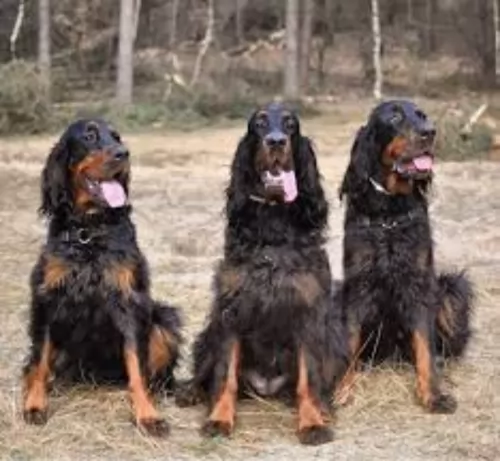 Gordon Terriers are energetic dogs so he is going to require a good deal of exercise each day. Take him with you on your walks and make sure that you give him lots of ball games and rope games.
Gordon Terriers are energetic dogs so he is going to require a good deal of exercise each day. Take him with you on your walks and make sure that you give him lots of ball games and rope games.
All Gordon Setters shed, and their coat will require a good brushing at least twice a week. Check nails, teeth and ears regularly. Brush teeth at least twice a week to prevent dental decay.
As a working dog your Gordon Setter has a special need for a high fat content diet. You can include some raw meat in his high-energy dog kibble. He can also have some cooked brown rice, chicken and vegetables added into his kibble from time to time. Make sure he has access to fresh, cool water.